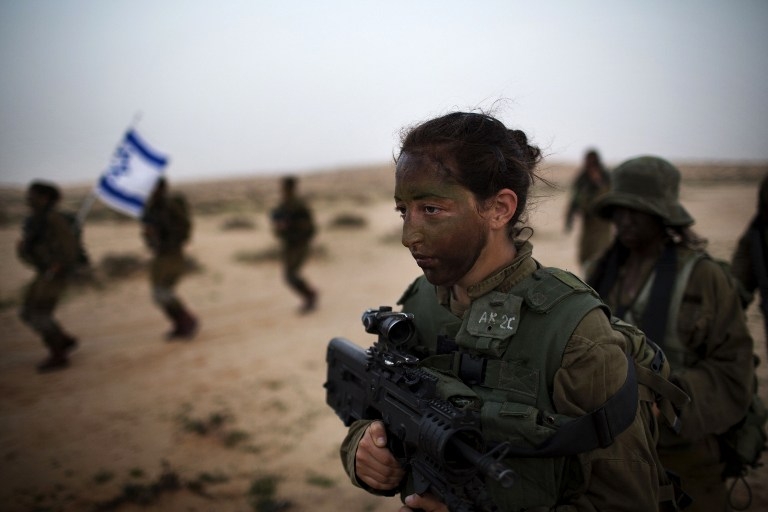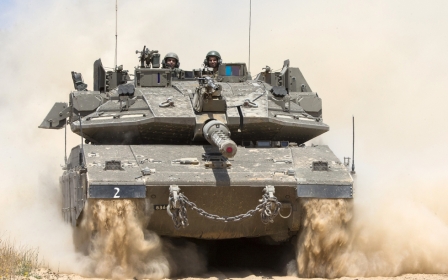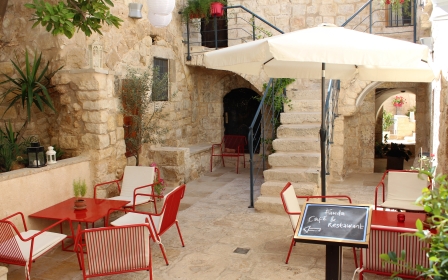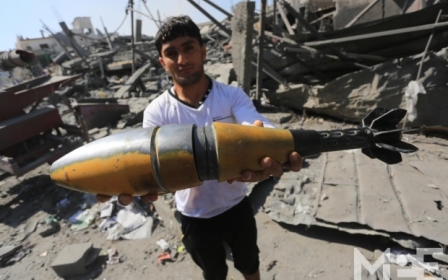Sexualising occupation: The uses and abuses of Israel’s female soldiers

One major anti-highlight of the August issue of VICE magazine is a “story” titled “The Defiant Femininity of Israel’s Female Soldiers”, which consists of a series of photographs by Israeli-born Mayan Toledano, herself a veteran of Israel’s universal draft.
In the introductory paragraph, we learn that because Toledano felt “stripped of all vestiges of femininity” and individuality during her military service, she created this photo series depicting “soldiers whose girlishness and teenage boredom act as a subtle but undeniable form of protest”.
The quality and composition of the images are hardly impressive and some could even be mistaken for advertisements for facial cleanser. The girls’ “subtle” activities include buttoning their shirts, looking at their cell phones, and lying in bed.
This is the second time in less than six months that Toledano’s Israeli woman soldier pictures have appeared at VICE. Their first appearance in March included a slightly longer intro by Maayan Goldman, who gushed about how “the young subjects fail, beautifully, to conform [and] are softly glowing in their singularity”.
Goldman again contends that, “in a way, it's their girly, teenage boredom that reflects a passive, sleepy protest against violence” - but fails to explain how complicity in an advanced killing machine might amount to a protest against violence and conformity.
To be sure, the thousands of Palestinians obliterated by the Israeli army over the past few years alone would presumably find intra-army “glowing” less than newsworthy.
Co-ed killing machine
Shortly after the August publication of Toledano’s photos, Forward, a US-based magazine for American Jews, ran what appeared to be a feminist critique of the operation, headlined: “Thanks, Vice. But Israel’s Female Soldiers Aren’t Just Pretty Faces”.
In it, the article’s author argued that “by treating the photographed women as if their continued woman-ness is a radical act, Vice fetishises the significance of their work; it doesn’t matter that she’s defending her country, it matters that she looks gorgeous while she’s doing it.” Such an approach, we’re told, will simply exacerbate the “rampant stereotyping and sexual harassment” to which women in the Israeli military are already subject.
But while arguments against harassment, sexist reductionism and objectification are obviously more than valid, there is some crucial context missing here. And that context consists of the fact that “defence of country” is an extreme euphemism for participation in an ongoing and brutal policy of ethnic cleansing and related forms of oppression.
In neither the VICE photo spreads nor the Forward rebuttal is there room for Palestinian victimisation at the hands of a trigger-happy, co-ed Israeli military. The spectrum of victimhood extends only from female Israeli soldiers fighting to retain feminine “vestiges” to female Israeli soldiers fighting discrimination.
Zoom out to the big picture, however, and you’ll find plenty of Palestinians with what might be deemed slightly more pressing existential concerns - such as being bulldozed in their homes or having their children’s outdoor activities lethally interrupted by Israeli missiles.
Airbrushing politics out
In a cringe-inducing interview with The Huffington Post, titled “Gorgeous Photos Capture The Unseen Lives Of Female Soldiers in Israel”, Toledano discussed her fear of being “suddenly stripped of all cultural ‘feminine’ symbols” by the military uniform.
“On a political note,” she added, “I oppose the occupation of Palestine”, but specified that “I think the reality of teenagers going into mandatory service… is worth documenting even without the political context”.
As it so happens, airbrushing politics out of an intensely and irremediably politicised landscape is one of the preferred pastimes of certain sectors of the Israeli establishment and other concerned pro-Israel entities.
One particularly memorable propaganda drive took place in 2007, when Maxim magazine hosted a spread of scantily clad female members of the Israeli military, accompanied by the important question: “They’re drop-dead gorgeous and can take apart an Uzi in seconds. Are the women of the Israeli Defense Forces the world’s sexiest soldiers?”
They were much sexier, no doubt, than all the dead bodies that had accumulated in the Gaza Strip and Lebanon the previous summer during Israel’s latest bout of mass slaughter - part of the reason the country’s image was in need of some touchups.
According to a March 2007 Jerusalem Post article about Maxim’s impending photographic expedition to Israel, headlined “Israel to put its babes forward in Maxim-um PR effort”, Israeli foreign ministry officials were hopeful that the photo shoot would “redefine… what the magazine’s hormone-charged readers think when they hear television reporters say ‘the situation in Israel is hot’”.
The Post quoted David Saranga, then consul for media and public affairs at Israel’s consulate in New York, as describing the effort as follows: “The Israeli models, Saranga said, were a ‘Trojan horse’ to present Israel as a modern country with nice beaches and pretty women” as opposed to a land of constant conflict.
No qualms here about objectifying the female body - or blatantly manipulating global public opinion.
And while bikini-based Trojan horse experiments and peddlers of “defiant femininity” will certainly draw their own crowds, here’s a news flash for the media: state terrorism just isn’t sexy.
- Belen Fernandez is the author of The Imperial Messenger: Thomas Friedman at Work, published by Verso. She is a contributing editor at Jacobin magazine.
The views expressed in this article belong to the author and do not necessarily reflect the editorial policy of Middle East Eye.
Photo: Israeli female soldiers of the 33rd Caracal Battalion take part in a graduation march in the northern part of the southern Israeli Negev desert in March 2013 (AFP)
This article is available in French on Middle East Eye French edition.
New MEE newsletter: Jerusalem Dispatch
Sign up to get the latest insights and analysis on Israel-Palestine, alongside Turkey Unpacked and other MEE newsletters
Middle East Eye delivers independent and unrivalled coverage and analysis of the Middle East, North Africa and beyond. To learn more about republishing this content and the associated fees, please fill out this form. More about MEE can be found here.





